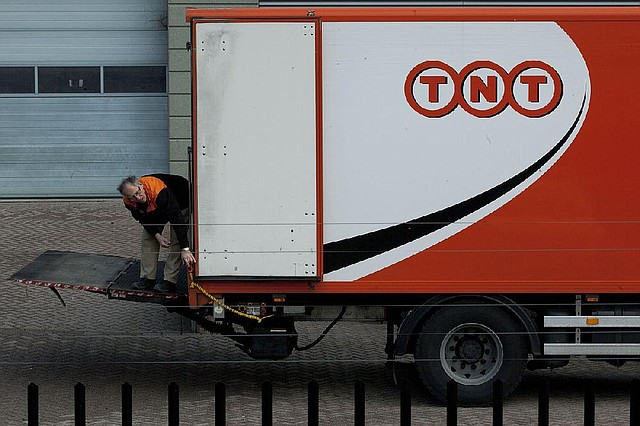UPS drops TNT bid after EU balks
A TNT Express NV employee operates the lift on a delivery truck in Hoofddorp, near Amsterdam, Netherlands, in this file photo. UPS has ditched its bid to take over TNT after learning European regulators would reject the deal.
Tuesday, January 15, 2013
LITTLE ROCK — United Parcel Service Inc., the world’s biggest package delivery company, scrapped its $6.9 billion bid for TNT Express NV after European regulators moved to block the deal.
Antitrust officials told the companies last week that the latest remedies were insufficient, according to TNT, which fell as much as 51 percent in Amsterdam. TNT will get a $267 million termination fee from UPS after formal rejection of the combination, the biggest to fail in Europe since BAE Systems Plc and EADS called off a merger in October.
“I’m surprised that the deal is not going through,” said Philip Scholte, an analyst at Rabobank International in Utrecht. “There’s quite a bit of competition in the express market and still the Europe-an Union continues to be very strict.”
EU Competition Commissioner Joaquin Almunia will reach a decision on the case by Feb. 5, spokesman Antoine Colombani said. The rejection of takeovers is rare, and since taking up his role in 2010, Almunia has blocked only the $9.5 billion takeover of NYSE Euronext by Deutsche Boerse AG and a bid by Aegean Airlines SA to merge with Olympic Air SA.
Shares of TNT Express fell 43 percent, reducing the Hoofddorp, Netherlands-based company’s market value to about $3.41 billion. Dutch postal operator PostNL NV, TNT’s biggest shareholder, dropped as much as 40 percent.
UPS shares climbed $1.32, or 1.7 percent, to close at $79.24.
UPS Chief Executive Officer Scott Davis said he was “extremely disappointed” by the failure of a deal that would have been the biggest in his company’s history, giving it a European market share similar to Deutsche Post AG’s DHL, the region’s top express operator.
While UPS had revised proposed concessions twice to include the sale of assets and the offering of air-network access to rivals, the European Commission has been seeking to create a player of a similar size to TNT to fill the void it would leave, Almunia told reporters last week.
The deal will be formally terminated once the “inevitable” prohibition ruling has been received, TNT said. The Dutch company added that it “regrets this situation, having believed the merger was feasible and beneficial for all stakeholders.”
UPS had agreed to buy TNT for $12.70 a share on March 19 last year after sweetening its bid from the $12.03 rejected the previous month. TNT stock closed at $8.48 on Feb. 17, the last day of trading before the talks were made public.
“This is critical for shareholders but not critical for TNT itself,” said Damian Brewer, a London-based RBC Capital Markets analyst.
TNT spokesman Cyrille Gibot said that the company, spun off from PostNL in 2011, will most likely use the payout from UPS to strengthen its balance sheet rather than to issue a special dividend to shareholders.
An agreement to sell TNT Airways and Pan Air Lineas Areas SA to Ireland’s ASL Aviation Group Ltd. was conditional on the closing of the UPS takeover, and will also be terminated, he said. ASL declined to comment on the accord.
The Dutch company will need to take decisions about the future of some non-European operations, such as TNT China, said Andre Mulder, an analyst at Kepler Capital Markets in Amsterdam with a “reduce” recommendation on the stock.
FNV Bondgenoten labor union representative Egon Groen said he had “mixed feelings” about the collapse of the TNT takeover.
“On the one hand there’s finally some clarity for the employees,” he said by telephone. “On the other, the takeover wasn’t out of luxury. They’d always said that this was the best option for TNT, so now what is it going to do?”
FedEx Corp., the second largest package-delivery company, was briefly regarded as a potential suitor for TNT after the rejection of UPS’ initial offer, and the Memphis-based business’s interest may now be reignited, Mulder said.
“FedEx cannot be fully excluded as a white knight,” he said. “The company would stand a much better chance of getting a takeover approved because of the small number of overlaps.”
The UPS-TNT collapse is Europe’s highest profile failure since a proposed $45 billion merger between European Aeronautic, Defence & Space Co., parent of Airbus SAS, and BAE, the region’s biggest weapons maker, was terminated Oct. 10 after opposition from the German government. Competition lawyers had said the deal would probably have been cleared by regulators.
Business, Pages 21 on 01/15/2013
